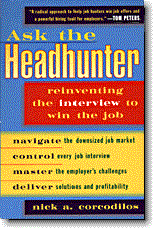Ask The Headhunter: Due Diligence
When you're considering a job offer, how's your "due diligence"? Do you do it in the job interview, or do you actually spend some time researching the company in advance, so you can form a clear judgment about it?
Most people research a prospective employer minimally. Some go no farther than reading a want ad or a job description, and asking the manager a few questions in the job interview. If they already know something about the company, they rely on their intuition. Usually, they're so glad to have a job offer that they fall prey to wishful thinking. But, it isn't just candidates that fail to carefully investigate employers. Companies usually don't check out job candidates very carefully, either. Diligence is typically lacking on both sides of the decision process.
In my opinion, the failure to research and understand one another is one of the key reasons why companies lay off employees and why workers quit jobs. They have no idea what they're getting into until it's too late.
Proper due diligence is extensive and detailed. How far you go with it is up to you. But, when you're considering an employer, I suggest that your minimum research should include the following.
Read:
The company's annual and quarterly SEC filings. (If you need help interpreting the financials, get it.)
The company's marketing and product brochures.
Articles about the company in the general business press and in industry-specific publications.
Articles about the company's industry, including its competitors. (The industry's problems are the company's problems, too.)
Competitors' marketing and product brochures.
The company's web site.
Competitors' web sites.
Talk with:
The hiring manager.
At least two people on the manager's team.
At least two people and managers in departments that would influence your success on the job (e.g., manufacturing, accounting, marketing).
At least one customer of the company. (Call a purchasing manager and ask his opinion of the company as a vendor.)
At least one vendor of the company. (Call the sales rep who handles the company and ask his opinion about it.)
At least one competitor of the company. (Call one of its sales reps, or a manager in a department related to the one you'd join. Be frank. Explain that you're considering a job there. What's their advice?)
At least two ex-employees of the company. (Find them through your own contacts, or ask current employees for names.)
Research is a funny thing. When it's part of our jobs, we do it thoroughly. When we need to do it for our own protection, we often skip it or we get sloppy. (We "trust our instincts".) As you do your research on a company, ask yourself:
What do I need to know?
What are the best sources of this information?
How good is each source?
Who can save me a lot of time by giving me the real inside scoop?
Have I really been thorough?
What could go wrong if I don't get good answers to my questions?
If all of this seems a bit much, remember that next to our friends and families, our employers represent the most important relationships we have. Remember that other people who have important relationships with your prospective employer practice due diligence: bankers, realtors, customers, vendors, venture capitalists and stock analysts. Can you afford to ignore it?
HBO CEO Resigning Amid AT&T Restructuring
6 years ago




No comments:
Post a Comment